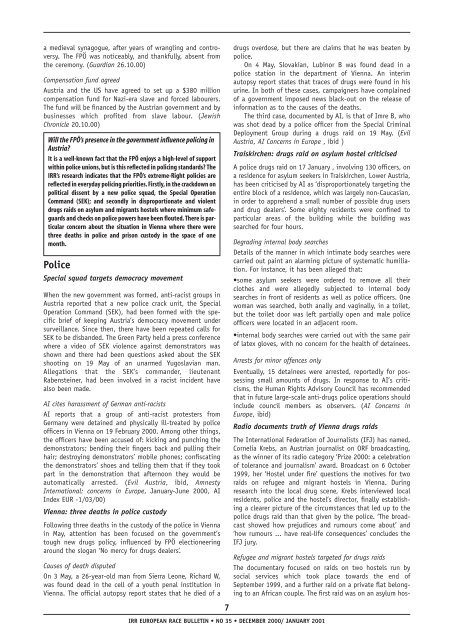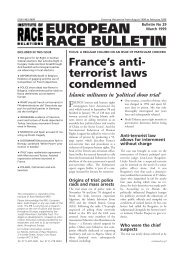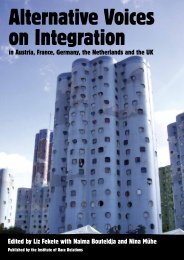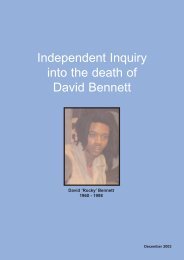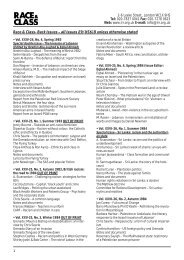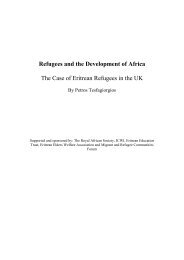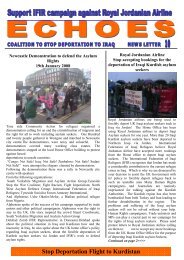EUROPEAN RACE BULLETIN - Institute of Race Relations
EUROPEAN RACE BULLETIN - Institute of Race Relations
EUROPEAN RACE BULLETIN - Institute of Race Relations
You also want an ePaper? Increase the reach of your titles
YUMPU automatically turns print PDFs into web optimized ePapers that Google loves.
a medieval synagogue, after years <strong>of</strong> wrangling and controversy.The FPÖ was noticeably, and thankfully, absent fromthe ceremony. (Guardian 26.10.00)Compensation fund agreedAustria and the US have agreed to set up a $380 millioncompensation fund for Nazi-era slave and forced labourers.The fund will be financed by the Austrian government and bybusinesses which pr<strong>of</strong>ited from slave labour. (JewishChronicle 20.10.00)Will the FPÖ’s presence in the government influence policing inAustria?It is a well-known fact that the FPÖ enjoys a high-level <strong>of</strong> supportwithin police unions, but is this reflected in policing standards? TheIRR’s research indicates that the FPÖ’s extreme-Right policies arereflected in everyday policing priorities. Firstly, in the crackdown onpolitical dissent by a new police squad, the Special OperationCommand (SEK); and secondly in disproportionate and violentdrugs raids on asylum and migrants hostels where minimum safeguardsand checks on police powers have been flouted. There is particularconcern about the situation in Vienna where there werethree deaths in police and prison custody in the space <strong>of</strong> onemonth.PoliceSpecial squad targets democracy movementWhen the new government was formed, anti-racist groups inAustria reported that a new police crack unit, the SpecialOperation Command (SEK), had been formed with the specificbrief <strong>of</strong> keeping Austria’s democracy movement undersurveillance. Since then, there have been repeated calls forSEK to be disbanded. The Green Party held a press conferencewhere a video <strong>of</strong> SEK violence against demonstrators wasshown and there had been questions asked about the SEKshooting on 19 May <strong>of</strong> an unarmed Yugoslavian man.Allegations that the SEK’s commander, lieutenantRabensteiner, had been involved in a racist incident havealso been made.AI cites harassment <strong>of</strong> German anti-racistsAI reports that a group <strong>of</strong> anti-racist protesters fromGermany were detained and physically ill-treated by police<strong>of</strong>ficers in Vienna on 19 February 2000. Among other things,the <strong>of</strong>ficers have been accused <strong>of</strong>: kicking and punching thedemonstrators; bending their fingers back and pulling theirhair; destroying demonstrators’ mobile phones; confiscatingthe demonstrators’ shoes and telling them that if they tookpart in the demonstration that afternoon they would beautomatically arrested. (Evil Austria, ibid, AmnestyInternational: concerns in Europe, January-June 2000, AIIndex EUR -1/03/00)Vienna: three deaths in police custodyFollowing three deaths in the custody <strong>of</strong> the police in Viennain May, attention has been focused on the government’stough new drugs policy, influenced by FPÖ electioneeringaround the slogan ‘No mercy for drugs dealers’.Causes <strong>of</strong> death disputedOn 3 May, a 26-year-old man from Sierra Leone, Richard W,was found dead in the cell <strong>of</strong> a youth penal institution inVienna. The <strong>of</strong>ficial autopsy report states that he died <strong>of</strong> a7drugs overdose, but there are claims that he was beaten bypolice.On 4 May, Slovakian, Lubinor B was found dead in apolice station in the department <strong>of</strong> Vienna. An interimautopsy report states that traces <strong>of</strong> drugs were found in hisurine. In both <strong>of</strong> these cases, campaigners have complained<strong>of</strong> a government imposed news black-out on the release <strong>of</strong>information as to the causes <strong>of</strong> the deaths.The third case, documented by AI, is that <strong>of</strong> Imre B, whowas shot dead by a police <strong>of</strong>ficer from the Special CriminalDeployment Group during a drugs raid on 19 May. (EvilAustria, AI Concerns in Europe , ibid )Traiskirchen: drugs raid on asylum hostel criticisedA police drugs raid on 17 January , involving 130 <strong>of</strong>ficers, ona residence for asylum seekers in Traiskirchen, Lower Austria,has been criticised by AI as ‘disproportionately targeting theentire block <strong>of</strong> a residence, which was largely non-Caucasian,in order to apprehend a small number <strong>of</strong> possible drug usersand drug dealers’. Some eighty residents were confined toparticular areas <strong>of</strong> the building while the building wassearched for four hours.Degrading internal body searchesDetails <strong>of</strong> the manner in which intimate body searches werecarried out paint an alarming picture <strong>of</strong> systematic humiliation.For instance, it has been alleged that:•some asylum seekers were ordered to remove all theirclothes and were allegedly subjected to internal bodysearches in front <strong>of</strong> residents as well as police <strong>of</strong>ficers. Onewoman was searched, both anally and vaginally, in a toilet,but the toilet door was left partially open and male police<strong>of</strong>ficers were located in an adjacent room.•internal body searches were carried out with the same pair<strong>of</strong> latex gloves, with no concern for the health <strong>of</strong> detainees.Arrests for minor <strong>of</strong>fences onlyEventually, 15 detainees were arrested, reportedly for possessingsmall amounts <strong>of</strong> drugs. In response to AI’s criticisms,the Human Rights Advisory Council has recommendedthat in future large-scale anti-drugs police operations shouldinclude council members as observers. (AI Concerns inEurope, ibid)Radio documents truth <strong>of</strong> Vienna drugs raidsThe International Federation <strong>of</strong> Journalists (IFJ) has named,Cornelia Krebs, an Austrian journalist on ORF broadcasting,as the winner <strong>of</strong> its radio category ‘Prize 2000: a celebration<strong>of</strong> tolerance and journalism’ award. Broadcast on 6 October1999, her ‘Hostel under fire’ questions the motives for tworaids on refugee and migrant hostels in Vienna. Duringresearch into the local drug scene, Krebs interviewed localresidents, police and the hostel’s director, finally establishinga clearer picture <strong>of</strong> the circumstances that led up to thepolice drugs raid than that given by the police. ‘The broadcastshowed how prejudices and rumours come about’ and‘how rumours ... have real-life consequences’ concludes theIFJ jury.Refugee and migrant hostels targeted for drugs raidsThe documentary focused on raids on two hostels run bysocial services which took place towards the end <strong>of</strong>September 1999, and a further raid on a private flat belongingto an African couple. The first raid was on an asylum hos-IRR <strong>EUROPEAN</strong> <strong>RACE</strong> <strong>BULLETIN</strong> • NO 35 • DECEMBER 2000/ JANUARY 2001


